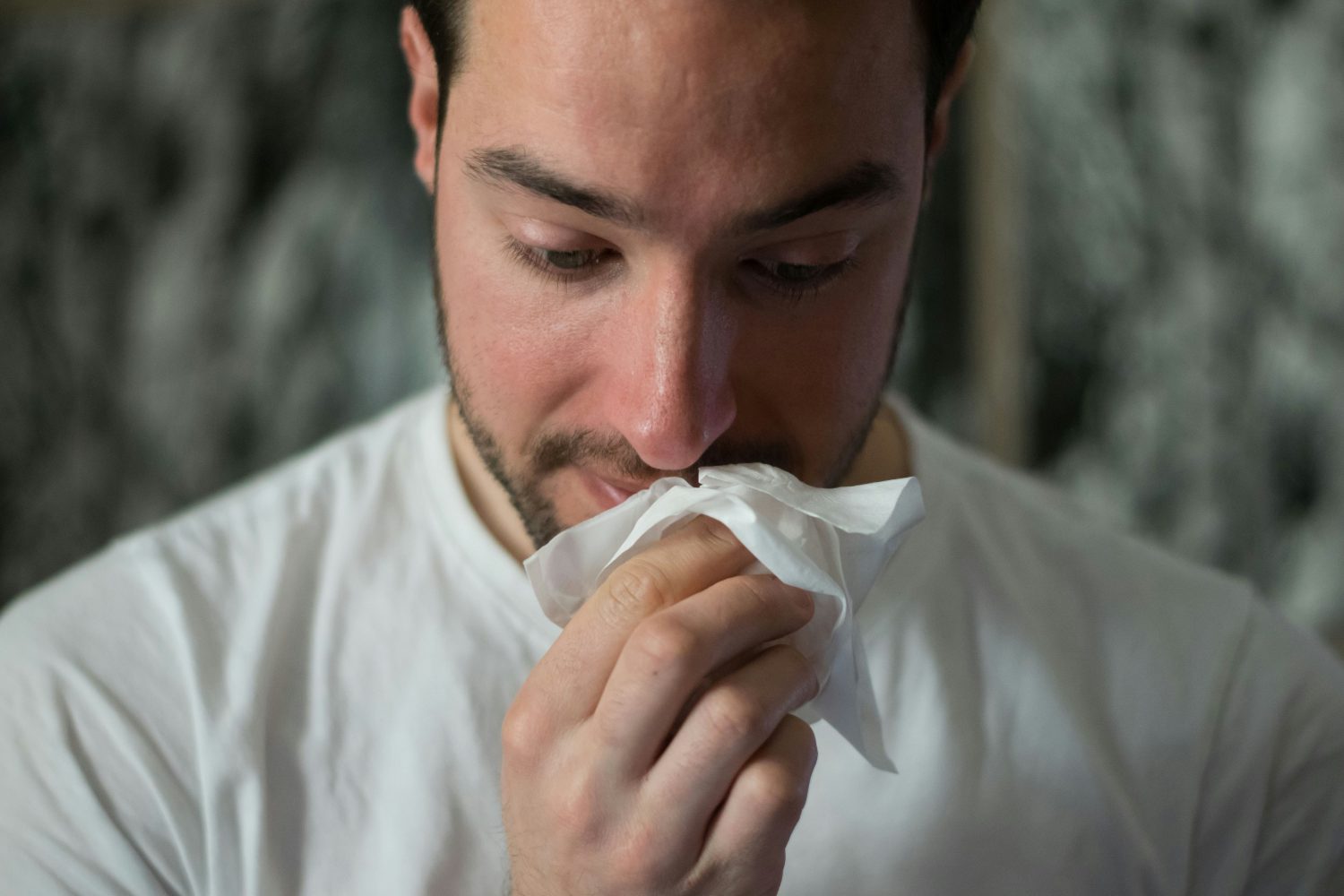Cold symptoms – Recognise and treat
The common cold is one of the most common illnesses affecting people worldwide. It is often dismissed as harmless, but can have a significant impact on daily life. The symptoms of a cold range from an annoying sore throat and a blocked nose to a persistent cough and general malaise. These symptoms can reduce productivity and have a significant impact on well-being.
Recognising and treating cold symptoms early is of great importance. By recognising the first signs of a cold, appropriate action can be taken to reduce the duration and severity of symptoms. This is not only important for individual health, but also to prevent the spread of the common cold to others. In this article, we will look at the most common cold symptoms in detail and introduce natural treatments and preventative measures that can help you stay healthy.
What is a common cold?
Definition and causes
A cold, also known as a flu-like infection, is a viral infection of the upper respiratory tract that affects the nose, throat, sinuses and windpipe. It is caused by a variety of viruses, most commonly rhinoviruses. These viruses spread easily through droplet infection when infected people cough or sneeze, as well as through direct contact with contaminated surfaces.
Colds are particularly common in the colder months as people spend more time indoors, which favours the transmission of viruses. Risk factors include a weakened immune system, stress, lack of sleep and smoking.
Difference between a cold and the flu
It is important to distinguish between a cold and the flu (influenza) as they can have similar symptoms but have different causes and severity.
- Common cold: A cold usually develops gradually and is generally less severe. Symptoms are usually mild and include a sore throat, runny or blocked nose, cough and low-grade fever. A cold usually lasts from one week to ten days.
- Flu: The flu is caused by influenza viruses and often starts suddenly with more severe symptoms. These include high fever, severe headache and aching limbs, extreme fatigue, chills and a dry cough. The flu can lead to serious complications such as pneumonia, especially in vulnerable groups such as the elderly, young children and people with chronic medical conditions.
Understanding the differences between the common cold and the flu is crucial to choosing the right treatment and avoiding potential complications.

Common symptoms of a cold:
Colds manifest themselves through a variety of symptoms that can vary in intensity. Here are the most common symptoms of a cold:
Sore throat
One of the first signs of a cold is often a sore throat. This is caused by inflammation of the mucous membranes in the throat and can range from mild scratchiness to severe pain, especially when swallowing.
Runny or blocked nose
A runny or blocked nose is a typical symptom of a cold. The nasal mucous membranes swell and produce more mucus to flush out the viruses. This can lead to a blocked nose, which makes breathing difficult, or to a runny nose, where mucus constantly flows out of the nose.
Coughing
Coughing is another common symptom. It often starts dry and becomes more productive as the cold progresses, meaning that mucus is coughed up. Coughing helps the body to clear the mucus from the airways.
Sneezing
Sneezing is a reflex reaction of the body to the irritation of the nasal mucous membranes by the cold viruses. It serves to remove the viruses from the respiratory tract and can occur very frequently.
Mild headache
Many people suffer from mild headaches during a cold. These can be caused by the inflammation of the sinuses or by general malaise and tiredness.
Muscle pain
Muscle pain, also known as myalgia, occurs with some colds. It is usually mild but can be uncomfortable and contribute to general malaise.
Tiredness and general malaise
Tiredness and a general feeling of malaise are common accompaniments to a cold. The body is working hard to fight the virus, which can lead to exhaustion. This can also be exacerbated by sleep disturbances caused by nasal congestion and coughing.
These symptoms can vary in intensity and usually subside within seven to ten days. It is important to rest and listen to your body’s signals to support the healing process.
Cold symptoms in detail
Sore throat
Causes and relief
A sore throat is caused by inflammation and irritation of the mucous membranes in the throat caused by cold viruses. This pain can be particularly unpleasant when swallowing.
Soothing methods:
- Warm drinks: tea with honey or lemon water can have a soothing effect.
- Gargling with salt water: A teaspoon of salt in a glass of warm water can help to reduce inflammation.
- Lozenges: Special sore throatlozenges can relieve pain and moisturise the throat.
- Humid air: A humidifier can help to keep the mucous membranes moist and soothe irritation.
Runny or blocked nose
Mechanisms and home remedies
A runny or blocked nose occurs when the mucous membranes of the nose swell and produce more mucus to flush out the viruses.
Home remedies:
- Inhalations: Vapour inhalations with essential oils such as eucalyptus or chamomile can soothe the mucous membranes.
- Nasal rinses: A saline solution can be used to rinse the nasal passages and remove mucus.
- Drink plenty of fluids: Sufficient fluid intake can help to liquefy the mucus and remove it more easily.
- Nasal sprays: Decongestant nasal sprays should only be used for a short time to avoid damaging the mucous membranes.
Cough
Types of cough and treatment options
Coughs can be dry or productive.
- Dry cough: This cough is usually present at the beginning of a cold and is caused by irritation of the airways. It can be soothed with cough suppressants and plenty of fluids.
- Productive cough: This cough occurs when mucus has accumulated in the airways. Expectorants and plenty of fluids help to liquefy the mucus and make it easier to cough up.
Sneezing
Why we sneeze and how to alleviate it
Sneezing is a reflex reaction of the body to irritation of the nasal mucosa caused by cold viruses. It serves to remove the pathogens from the respiratory tract.
Mitigation methods:
- Avoidance of irritants: Avoid smoke, dust and other irritants that can increase sneezing.
- Rinsing your nose: Rinsing your nose can help to remove irritants.
- Humidified air: A humidifier can help to keep the mucous membranes moist and reduce irritation.
Headaches and muscle aches
Connection with colds and relief techniques
Headaches and muscle aches are common accompaniments to a cold and are caused by the body’s general inflammatory response.
Relief methods:
- Painkillers: paracetamol or ibuprofen can relieve headaches and muscle aches.
- Warm baths: A warm bath can relieve muscle pain and have a relaxing effect.
- Sufficient sleep: Rest and recuperation are important to support the body.
Tiredness and discomfort
Causes and recovery strategies
Fatigue and a general feeling of discomfort occur because the body needs energy to fight the virus.
Recovery strategies:
- Adequate sleep: make sure you get enough sleep to aid the recovery process.
- Healthy diet: A balanced diet can strengthen the immune system and speed up recovery.
- Drink plenty of fluids: Adequate fluid intake is important to support the body and loosen mucus.
- Gentle exercise: Light exercise can help promote circulation and reduce fatigue, but should not be overdone.
By using these soothing methods, the symptoms of a cold can be alleviated more effectively and the healing process can be supported.

Natural treatment methods
Home remedies for cold symptoms
Herbal teas and honey
Herbal teas and honey are tried-and-tested home remedies to alleviate cold symptoms.
- Herbal teas: Teas made from camomile, peppermint or ginger have a soothing, anti-inflammatory and expectorant effect on the mucous membranes. Camomile tea can soothe a sore throat, while peppermint tea helps with a blocked nose.
- Honey: Honey has antibacterial properties and can soothe a sore throat and reduce the urge to cough. A spoonful of honey in tea or pure before going to bed can be beneficial.
Inhalations and steam baths
Inhalations and steam baths can help to clear the airways and soothe the mucous membranes.
- Steam baths: A steam bath with essential oils such as eucalyptus or tea tree oil can moisturise the mucous membranes and loosen mucus. Simple inhalations with hot water and a towel over your head are also effective.
- Inhalation devices: These devices produce a fine vapour that penetrates deep into the airways and is particularly helpful for stubborn nasal congestion and coughs.
Rest and sleep
Sufficient rest and sleep are essential for recovery.
- Rest: The body needs energy to support the immune system. Avoid strenuous activities and allow yourself regular breaks.
- Sleep: Sufficient sleep promotes healing and strengthens the immune system. A good night’s sleep helps the body to regenerate and recover more quickly.
Food supplements and vitamins
Vitamin C and zinc
Vitamin C and zinc are known for their positive effects on the immune system and can reduce the duration and severity of a cold.
- Vitamin C: It has an antioxidant effect and supports the immune system. High doses of vitamin C, especially at the beginning of a cold, can alleviate the symptoms. Vitamin C is found in many fruits such as oranges, kiwis and berries.
- Zinc: Zinc helps to inhibit the multiplication of cold viruses and strengthen the immune system. Zinc supplements or zinc-rich foods such as nuts and seeds can be helpful.
Herbs and natural remedies
Herbs and natural remedies can support healing and alleviate the symptoms of a cold.
- Echinacea: This herb is known for its immune-boosting properties and can shorten cold symptoms.
- Elderberry: Elderberries have antiviral properties and can reduce the duration of a cold.
- Ginger: Ginger has an anti-inflammatory and expectorant effect, which is helpful for sore throats and coughs. Fresh ginger tea is an effective home remedy.
By using these natural treatment methods, cold symptoms can be gently alleviated and the healing process supported. The combination of tried and tested home remedies, sufficient rest and targeted supplementation with vitamins and herbs can help you to recover more quickly.
Prevention of colds
Hygiene measures
Adhering to good hygiene measures is crucial to prevent the spread of cold viruses.
- Hand washing: Wash your hands regularly and thoroughly with soap and water, especially after contact with potentially contaminated surfaces and before eating.
- Cough and sneeze etiquette: Cough or sneeze into a tissue or the crook of your arm to prevent the spread of droplets. Dispose of used tissues immediately and wash your hands.
- Avoid close contact: Avoid close contact with people who have a cold and stay at home if you are ill yourself to avoid infecting others.
- Disinfection: Regular disinfection of frequently touched surfaces such as door handles, light switches and mobile phones can reduce the spread of viruses.
Strengthening the immune system
A strong immune system is the best defence against colds.
- Diet: A balanced diet rich in fruit, vegetables, wholemeal products and healthy fats provides the body with the nutrients it needs to strengthen the immune system.
- Vitamins and minerals: Make sure you get enough vitamin C, vitamin D, zinc and other important nutrients. Dietary supplements can be useful if required.
- Probiotics: Foods with probiotics, such as yoghurt and fermented foods, can promote gut health and boost the immune system.
Diet and lifestyle
A healthy lifestyle contributes significantly to the prevention of colds.
- Avoid smoking: Smoking weakens the immune system and damages the respiratory tract, increasing the risk of catching a cold.
- Reduce alcohol consumption: Excessive alcohol consumption can weaken the immune system and increase susceptibility to infections.
- Stress management: Chronic stress can affect the immune system. Techniques such as meditation, yoga or breathing exercises can help to reduce stress.
Regular exercise and sufficient sleep
Regular physical activity and sufficient sleep are essential for the health of the immune system.
- Exercise: Regular exercise, such as walking, running or swimming, can strengthen the immune system and improve overall health. It is important not to overdo it, as excessive exercise can weaken the immune system.
- Sleep: Adequate sleep is crucial for resting the body and maintaining a strong immune system. Ideally, adults should aim for 7-9 hours of sleep per night.
By combining these preventative measures, you can significantly reduce the risk of catching a cold and improve your overall health and resistance to infection.
Conclusion
Colds are common and can have a significant impact on daily life. Early recognition and treatment of symptoms is crucial to minimise the duration and severity of the common cold. Common symptoms include a sore throat, runny or stuffy nose, coughing, sneezing, headache, muscle aches and general fatigue.
A variety of natural treatments can help to alleviate these symptoms. Herbal teas, honey, inhalations and sufficient rest are tried and tested home remedies. Supplemented by dietary supplements such as vitamin C and zinc as well as natural remedies such as echinacea and elderberry, these measures can support recovery and strengthen the immune system.
Prevention plays an equally important role. Good hygiene measures, a healthy diet, a balanced lifestyle, regular exercise and sufficient sleep are crucial to reducing the risk of catching a cold.
By combining these approaches, you can not only effectively treat the symptoms of a cold, but also improve your overall health and resistance to infection. Pay attention to your body, react to symptoms early and strengthen your immune system through healthy habits – this will keep you fit and healthy during the cold season.
